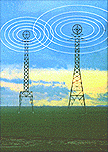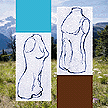|
terre thaemlitz writings 執筆 |
|
Die Roboter Rubato Piano Interpretations of Kraftwerk Titles Arranged & Performed by Terre Thaemlitz - Terre Thaemlitz |

List of Tracks
- Die Roboter
- Ätherwellen
- Tour de France
- Computer Welt
- Techno Pop
- Ruckzuck
- Radioland
- Mensch Machine
- Schaufensterpuppen
- Morgen Spaziergang
Preface
- Die Roboter: English translation: "The Robots." Aside from being the title of
one of Kraftwerk's more popular works, the recurrent theme of Die
Roboter, including the substitution of robots resembling group members
during performances, has become symbolic of the group itself.
Rubato: Music performance that does not adhere to a strict sense of time.
In producing and recording these piano solos I have attempted to construct a style and sound which reflects the complexity of thematics established by Kraftwerk over the past two and a half decades, as well as my own changing and contradictory relationships to those thematics. Consistency of tempo and key, trademarks of Kraftwerk's compositions, are often abandoned. Melodies become obscured, warped and inverted, lost then found, only to be lost again. The piano sound itself is digitally processed, with intrusive noise and flooding resonance taking the place of Kraftwerk's meticulous clarity of technique. Noise which distorts and clouds like interpretive processes. Resonance which mimics the frustrating search for resonant phrases and associations with Kraftwerk's compositions and thematics.
Technopop
Kraftwerk's German titles and lyrics are referenced in this text, with literal English translations of lyrics replacing the lyrics found in their English releases, under the self-critical and admittedly cynical pretense of identifying origin. The identification and eschewing of a concept of origin is central to Kraftwerk's commentary on production and authorship. While the manufacturing of mannequins and robots in their own likeness promotes an image of authorless mechanization and replication, they are also known for filing major lawsuits against unauthorized sampling of their works, including their notorious battle for the rights to Afrika Bambaataa's hip hop classic Planet Rock, which used music from Trans Europe Express. As these annotations are written in English, and as my primary constructed audience [American Kraftwerk and electronic music enthusiasts] is most likely more familiar with Kraftwerk's English titles, it is my intention that when reading German titles this momentary dislocation and ensuing identification of referentiality shall serve as a metaphor for the prescriptively Modernist flavors of alienation and insularity present in Kraftwerk's discourse, as well as a contextualization of the interpretive processes of the listeners/readers, and a critical acknowledgment of the limitations and desires of my own commentary.
Referentiality Non Stop
- Wir fahr'n fahr'n farh'n auf der Autobahn
.... Jetzt schalten wir das radio an
Aus dem lautsprecher klingt es dann
'Wir fahr'n auf der Autobahn...'
We're drivin' drivin' drivin' on the Autobahn
.... Now we turn the radio on
From the speaker the sound comes
"We're drivin' on the Autobahn..."
- Autobahn, Kraftwerk (1974)
 Morgenspaziergang |
 Ruckzuck |
| 1 The concept of the avant garde is herein rejected for its function since the late 1920's as a vehicle for dominant culture to recuperate reformist metaphors into high culture, ultimately becoming the spectacle of the wild beast within the confines of the gallery epitomized by Expressionism. It is also recognized as a primary venue of distribution and discourse for contemporary electronic music, placing at issue processes of recuperation implicit in my own projects. |
Wo Spricht die Stimme der Energie? (Where Speaks the Voice of Energy?)
Kraftwerk isolates post-Industrial technologies as the vehicles through which Man [engendered] constructs and loses identity. These technologies are both symptomatic and pro-actively affirmative of Western and Global First-World Cultures.
- Hier spricht die Stimme der Energie
Ich bin ein riesiger elektrischer Generator
Ich liefere Ihnen Licht und Kraft
Und ermögliche es Ihnen, Sprached, Music und Bild
Durch den Äther auszusenden und zu empfangen
Ich bin Ihr Diener und Ihr Herr zugleich
Deshalb hütet mich gut
Mich, den Genius der Energie
Here speaks the voice of energy
I am an enormous electric generator
I supply their light and power
And make possible their language, music and art
Travelling through the air to the receiver
I am simultaneously your servant and your master
So protect me well
I, the genius of energy
- The Voice of Energie, Kraftwerk (1975)
 Ätherwellen |
- Es strahlen die Sender
Bild, Ton und Wort
Elektromagnetisch
An jeden Ort
Radiating from the transmitter
Pictures, sound and words
Electromagnetically
In every location
- Antenna, Kraftwerk (1975)
Within this continual barrage of influence, much of Kraftwerk's project assumes a stance which is ultimately complacent in its exhaltation of the spectacle of post-Industrial cultures:
- Radio Sender
Und Hörer sind wir
Wir spielen im Äther
Das Wellenklavier
We are radio transmitters
And listeners
Playing the piano waves
Of the air
- Antenna, Kraftwerk (1975)
But can one develop a more complex relationship to such influences than play without purporting to transcend or evade such influences? May one/I [schauspiel/Thaemlitzschauspiel] select, distort and ultimately engage in critical dialogue with that to which one/I [zuschauer/Thaemlitz-zuschauer] respond(s)? In the instance of these piano recordings and their original referents, which takes precedence: their stylistic and thematic variance, or their engagement with a mutual discourse that overrides intent with avant garde? Or rather, to what extent is an acceptance of the latter implicit in an understanding of the former, and how can the resulting circumstance contribute to a strategy of social action?
Spiegelsaal (The Hall of Mirrors)
- Der junge Mann betrat eines Tages den Spiegelsaal
Und entdeckte eine Spiegelung seines Selbst
One day the young man stepped into the hall of mirrors
And discovered a reflection of himself
- Spiegelsaal, Kraftwerk (1978)
 Schaufensterpuppen |
Frustrated by my inability to resolve binarisms, I am momentarily caught in the vanity of an over-marketed antagonism against Pop Political Correctness, an antagonism with an underlying nihilism which holds the promise of tranquillity in inefficacy (an absence of the potential for disturbance). But I soon concede that I am reacting to a cultureschauspiel intended to conceal the potential for direct political action so as to maintain the status quo. From this state of informed paralysis I contemplate identities which will allow me to enact in a capacity similar to the manner in which I sense identities acting upon myself.
For Kraftwerk, this struggle to construct identities serves as their primary function as Artists:
- Der Künstler lebt im Spiegel
Mit dem Echo seines Selbst
Sogar die gröBten Stars
Leben ihr Leben im SpiegelglaB
The artist lives in the mirror
With the echoes of himself
Even the greatest stars
Live their lives in the looking glass
- Spiegelsaal, Kraftwerk (1978)
 Spiegelsaal |
Die Mensch Machine als Sex Object (The Man Machine as Sex Object)
Integral to a concept of identity amidst the images is a concept of surrogacy - objects and imagery which become the basis for deriving and conveying content about oneself as zuschauer. For Kraftwerk, post-Industrial technologies are the surrogates of choice, assuming human form in mannequins and robots. Accordingly, technologies take on meaning through contextualization and utilization to the same extent that I derive self-content through their appeal, attainment and utilization. Emerging from this perpetual exchange (if not fictional exchange) of information is the location of content within the technologies themselves - a fetishization of the Mensch Machine.
| 2 While this process of identification involves many engendered signifiers which emphasize the social prioritization of Masculinity and men, it is not a specifically Male process. Rather, it is herein seen as a dominant ideological point of reference which contributes in multiple and ever inconsistant ways toward the construction of concepts of self among women, men and transexuals. |
While Kraftwerk seems to embrace this concept of fetishism with self-parodying fervor, I find myself distracted by the radical clarity with which they pronounce a simplistic Masculine engendering of such technologies. Kraftwerk's stance is overly symptomatic of traditional Western Patriarchal and Hetero-normative concepts of technology: machines function as heroic extensions of Masculinity which allow patriarchal societies to dominate Mother Nature. For Kraftwerk, it is through Mensch Machines that Man [engendered] attempts to compensate for His inability to locate a Natural [feminine engendered] essence of the self.2 It is in reference to this concept that these recordings utilize digital representations of piano (mechanical reconstructions of an overtly Romantic and organic signifier) and are performed in a stylistic vein which sets out to deconstruct the Expressionist gestures it epitomizes.
 Radioland |
 Tour de France |
| 3 The term "Queer," as reappropriated since the late 1980's by such groups as Queer Nation, references pansexual and transgendered concepts of sexual identity and is used as an alternative to identities such as Lesbian, Gay and Bisexual which operate in relation to the restrictive dichotomy of Heterosexual/Homosexual. As a reappropriation, the term "Queer" immediately discloses its contingency upon context. By de-essentializing sexual identities as social constructs through which people manifest their sexuality, rather than as immutable biological preconditions, Queerness places the construction of sexual identities within the social sphere, reinscribing their underlying cultural dynamics with the potential for social reform. The intent is to diffuse dominant fictions that Heterosexism and Homophobia are justified as Natural attempts to suppress sexual diversity and maintain dominant social orders. Similarly, Queerness is a response to discussions of biological predeterminism within Lesbian and Gay communities, as such discussions can be turned against members of pansexual and transgendered communities who reject the Heterosexual/Homosexual paradigm in favor of a multiplicity of identities, and for whom concepts of identity are more openly related to the complication and/or subversion of cultural norms. |
Immediate questions come to mind: for all of the obviousness of homoerotic thematics in the world of the Mensch Machines, how do such thematics remain undiscussed by popular media? Is the dominant silence around homoerotic themes an act of social suppression or social obliviousness? In the case of the latter, can the discussion of such a metaphor's placement at the heart of hetero-normative ideologies assist in the deconstruction of such ideologies? In the case of the former, can the mechanisms of suppression be identified and sabotaged?
Femme Machine
 Die Roboter |
Emerging from the actions of this reconstructed body I contemplate discourses which speak of specificity rather than universalism. Sound as discourse which actively discloses a concept of referentiality and contents that intermingle with my intentions as producer. Means of production that treat methodologies as the endlessly reoccurring shadows of those signifiers undergoing deconstruction. I contemplate a Femme Machine which critically embodies all that it disavows.
Donning lace and makeup, I sit before my computer and contemplate.
T. - (Hee)E. - (Hee)E.
 Computerwelt |
I return to the frightful image of Kraftwerkschauspiel's transformation from a concept of referentiality to one of non-productivity and self-insularity. Placing the image like a transparent overlay upon the mappings of my own actions, I begin retracing the lines of commonality in hopes of envisioning a new course of action.